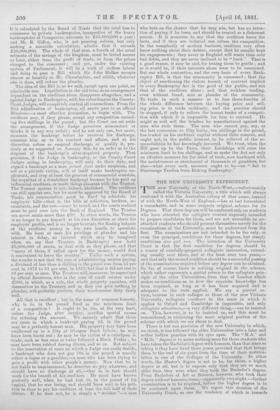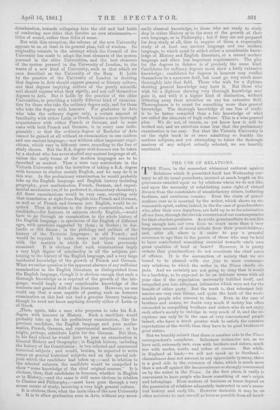THE NEW UNIVERSITY EXPERIMENT.
THE new University of the North-West,—unfortunately called the Victoria University, a title which will always confound it with the Australian colony of that name, instead of with the North-West of England,—has at last formulated a remarkable, and in some respects original, scheme for its Degrees. That these degrees will be conferred only on students who have attended the collegiate courses expressly intended to prepare candidates for them, and are not accessible to un- attached students who should present themselves merely for the examinations of the University, must be understood from the first, The examinations are not intended to be the only, or even the principal, conditions for• these degrees, but simply conditions sine qua von. The intention of the University Court is that the first condition for degrees should be a course of carefully-prepared collegiate instruction, extend- ing usually over three, and at the least over two years,— and that only the second condition should be a successful passing of the examinations required before any degree can be obtained. So far, of course, there is nothing original in the scheme, "which rather represents a partial return to the collegiate prin- ciple of the older Universities, from that of London which makes no conditions as to how the requisite knowledge has been acquired, so long as it has been acquired and is adequate to the tests applied. We say a partial re- turn, because in such colleges as those of the new Victoria University, collegiate residence in the sense in which it applies to Oxford and Cambridge is impossible, and only collegiate attendance,—a very different thing,—can be insisted on. This, however, is to be insisted on, and this must be remembered, in criticising the more original portion of the scheme with which we are about to deal.
There is but one provision of the new University in which, we think,. it has followed the older Universities into a false and rather hollow practice with its eyes open. The "M.A." and " M.Sc." degreeis to mean nothing more for those students who have taken the Bachelor's degree with honours, than that since so taking it they have lived three years, provided that that brings them to the end of six years from the time of their matricu- lation in one of the Colleges of the University. In other words, the Master's degree is not to be, for them, a higher degree at all, but is to express only that they are so much older than they were when they took the Bachelor's degree. From Bachelors of Art or Science, however, who took their degree without honours, some,—apparen tly very Blighty—further examination is to be required, before the higher degree is to be conferred upon them. Wo regret this decision of the University Court, as one the tendency of which is towards
deterioration, towards collapsing into the old and bad habit of conferring new titles; that involve no new attainments,— titles of sound, rather than titles of sense.
But with this exception, the scheme of the new University appears to us, at least in its general plan, full of wisdom. Its originality consists in the attempt which the Council of the University has made to adapt the best elements of the system pursued in the older Universities, and the best elements of the system pursued in the University of London, to the wants of a new kind of University, such as that which we once described as the University of the Busy. It holds by the practice of the University of London in deciding that degrees in Arts should express general or literary culture, and that degrees implying culture of the purely scientific sort should express.what they signify, and not call themselves degrees in Arts. But it holds by the practice of the older Universities, in providing a totally different kind of examina- tion for those who take the ordinary degree only, and for those who take the degree with honours. For graduates in Arts who take the ordinary degree only, a certain amount of familiarity with either Latin or Greek, besides a more thorough acquaintance with either French or German, and in some cases with both French and German, is in every case indis- pensable ; so that the ordinary degree of Bachelor of Arts cannot be gained at all without an examination in one modern and one ancient language,—nor without other important requi- sitions, which vary in different cases, according to the lino of study chosen. But the B.A. degree with honours can be taken by a student who has never studied any ancient language at all, unless the early forms of the modern languages are to be described as ancient, Thus a man may matriculate in the Victoria University with the intention of taking a B.A. degree with honours in studies mainly English, and lie may do it in this way. In the preliminary examination he would probably take up the English language and English history including geography, pure mathematics, French, German, and experi- mental mechanics (or, if he preferred it, elementary chemistry). All these examinations would be very easy, excepting only that translation at sight from English into French and German, as well as of French and German into English, would be re- quired. Then in relation to the degree examination, such a candidate,--for honours in subjects chiefly English would have to go through an examination in the whole history of the English language ; in specimens of the English of different ages, with questions suggested by them ; in Gothic ; in Ice- landic or Old Saxon ; in the philology and outlines of the history of the Teutonic languages ; in old French ; and would be required to write essays on subjects connected with the matters in which he had been previously
examined. It is obvious that such examinations imply a very high degree of scholarship in all the subjects per- taining to the history of the English language, and a very large incidental knowledge of the growth of French and German. What we rather question is the apparent absence of any sufficient examination in the English literature, as distinguished from the English language, though it is obvious enough that such a thorough knowledge as is required of the growth of the lan- guage, would imply a very considerable knowledge of the contents and general drift of the literature. However, no one could say that a man capable of passing such an honours examination as this had not had a genuine literary training, though he need not know anything directly either of Latin or of Greek.
,Then, again, take a man who proposes to take his B.A. degree with honours in History. Such a candidate would probably take up for his preliminary examination, like the previous candidate, the English language and pure mathe- matics, French, German, and experimental mechanics ; or he might, perhaps, substitute Latin for the German. But then, in his final school he would have to pass an examination in General History and Geography ; in English history, including the history of the Constitution ; in two selected and announced historical subjects ; and would, besides, be expected to write essays on general historical subjects, and on the special sub- jects which the candidate had taken up ;—and in relation to the selected subjects, the candidate would be compelled to show " some knowledge of the chief original sources." It is obvious, then, that candidates in honours, whether in English or in History,—and the same is still more obvious in relation to Classics and Philosophy,—must have gone through a very severe course of study, involving a very high general culture.
It is obvious, then, what the main idea of the new University is, It is to allow graduation even in Arts, without any neces-
sarily classical knowledge, to those who are ready to study deep in either History or in the story of the growth of their own language, or in Philosophy ; but if they are not prepared for deep study at all, then to require of them a respectable study of at least one ancient language and one modern language, to which must be added either a considerable know- ledge of History and English literature, or a second modern language and other less important requirements. The plan. for the degrees in Science is of precisely the same kind. Candidates for ordinary degrees must show a fairly extensive knowledge ; candidates for degrees in honours may confine themselves to a narrower field, but must go very much more thoroughly into that field. Those who wish for a diploma showing general knowledge may have it. But those who wish for a diploma showing very thorough knowledge may gain it, and with it a higher kind of distinction, without frittering away their attention on any too extensive field. Thoroughness is to count for something more than general knowledge. The thorough knowledge of one line of study, is to be better rewarded than a fair knowledge of what are called the elements of high culture. This is a wise genera' plan. We do not, of course, as yet know how it will be worked out, and we entertain some fear that the preliminary examination is too easy. But that the Victoria University is on the right track in at once admitting so frankly the modern subjects, and yet attempting to foster the thorough mastery of any subject actually selected, we are heartily convinced.



































 Previous page
Previous page